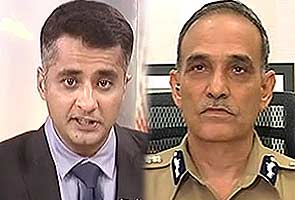Written by Tejas Mehta | Updated: August 27, 2013
Mumbai: Is dancing in pubs and dance bars or a mere kiss in public promoting a “promiscuous culture”? Satyapal Singh, the police commissioner of India‘s most cosmopolitan city, Mumbai, certainly thinks so.”That is why I’m asking whether on one hand couples should be allowed to kiss in public and on the road, should they be allowed to indulge in obscene things? We have to strike a balance. On the one hand you want to have a promiscuous culture and on the other hand you want a safe and secure environment for the people,” Mr Singh told NDTV.
The controversial statement comes just days after the Mumbai Police earned kudos for arresting in just 70 hours all five men accused of gang-raping a 22-year-old photojournalist. Adding to the embarrassment, Mr Singh indicated ‘moral’ policing was one of the answers to the city’s growing sex crimes against women.
“I don’t understand the media and these so-called activists. They start criticising the police on moral policing. Should we do moral policing or immoral policing? I think choice is yours. If we are doing moral policing it is for the betterment of society. But after the hue and cry, on the one hand we want to increase and support this kind of culture and on the other hand we want to stop cases of sexual assault against women. I think we have to strike a balance as to what kind of culture and society we want. We ourselves are confused.”
Mumbai is no stranger to this mind-set. Home Minister RR Patil first banned dance bars and said they were “corrupting the youth”. More recently, Assistant Commissioner of Police (ACP) Vasant Dhoble earned notoriety by raiding pubs and nightclubs and slapping outdated laws against them. He was also caught on CCTV wielding a hockey stick against the owner of an illegal eatery. There were those who supported him and saw him as an honest officer. But after one section of the public revolted against his ways, Mr Dhoble was transferred.
And then BJP‘s corporator Ritu Tawde joined the bandwagon by demanding a ban on lingerie mannequins as the plastic models were “promoting rape and sex crimes.” Not surprisingly, it was unanimously passed by corporators cutting across party lines.
And just a few months ago, the police issued a bizarre circular asking the force to take action against couples indulging in “indecent” behaviour. Again, the police had to withdraw it after the media highlighted the issue.
“Policing is not some hockey stick wielding cop who goes about targeting innocent people. This seems to be medieval idea. His priorities are misplaced. The police commissioner himself needs to strike a balance and enforce the law and he is the one who seems confused,” Gerson D’Cunha, the convener of the NGO AGNI said.
The problem remains that Mumbai is administered and governed by those who come from very different backgrounds. There is a yawning gap between the perceptions of what is decent and indecent and therefore is a growing disconnect. Urban realities seemed to always escape our politicians and cops.
While the differences are real, to force people to accept them with the fear of action under outdated laws has proved to be not just detrimental for the police force, but also often violative of basic freedoms guaranteed under the Constitution.
Related articles




Leave a Reply